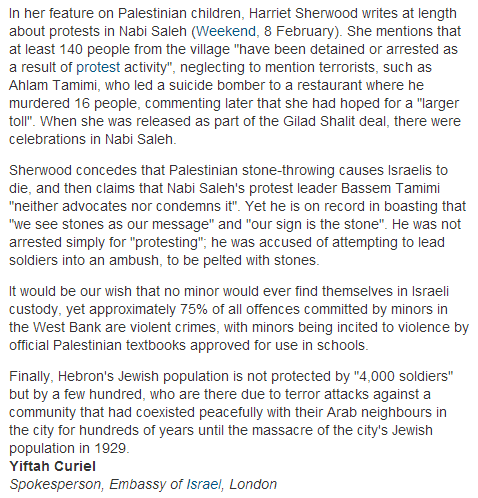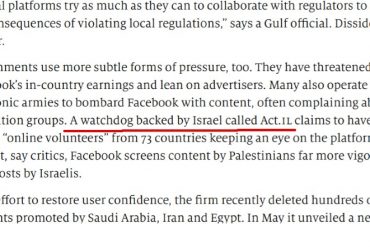1) The ITIC provides a backgrounder on Hamas encouragement for terrorist attacks in Judea and Samaria which includes information on the recent exposure of a large Hamas terrorist network in Judea and Samaria which has to date been totally ignored by the BBC.
“Operatives for the terrorist network were recruited from Judea and Samaria, including from Ramallah, Hebron and Jenin. One of the head recruiters was Hijazi Qawasmeh, a Hamas operative from Hebron, who was detained by Israel several times in the past for planning terrorist attacks and membership in Hamas. Hijazi Qawasmeh recruited operatives in Judea and Samaria and met with senior Hamas operatives abroad, receiving instructions and hundreds of thousands of shekels to fund terrorist activities. Saleh al-‘Arouri offered him a million dollars to carry out an abduction. Hijazi Qawasmeh is related to Mahmoud Qawasmeh, deported to the Gaza Strip in the Gilad Shalit prisoner exchange deal and who operates from Gaza to organize terrorist attacks in Judea and Samaria.”
2) At the JCPA, Yoni Ben Menachem discusses Why Britain Declared the Hamas Movement as a Terrorist Organization.
“According to sources in the Gaza Strip, several hundred Hamas operatives work in three “humanitarian” fundraising associations in London. The money does not reach Gaza residents and flows directly into the pockets of Hamas leaders. Money is deposited in the HSBC Bank in Britain or Turkish banks, per Muslim Brotherhood instructions. Sixty charitable associations were established in the UK alone for the Hamas fundraising. One organization the Islamic Aid Organization also received funding from the British government.”
3) UN Watch documents 2021-2022 UNGA Resolutions on Israel vs. Rest of the World.
“In the current 76th session of the UN General Assembly (2021-2022), EU member states are likely to vote for one resolution each on the human rights situations in Iran, Syria, North Korea, Myanmar, and Crimea. […] By contrast, EU states will likely vote in favor of nearly all 14 resolutions singling out Israel.
These same EU states have failed to introduce a single UNGA resolution this year on the human rights situation in China, Venezuela, Saudi Arabia, Cuba, Turkey, Pakistan, Vietnam, Algeria, or on 175 other countries.”
4) At WINEP, Omer Carmi has been Reading Through Iran’s Nuclear Demands.
“After a months-long pause, the Iran nuclear negotiations will resume on November 29 in an attempt to revive the Joint Comprehensive Plan of Action (JCPOA). To set the stage for the Vienna meetings, the official newspaper of President Ebrahim Raisi’s government published an editorial on November 14 titled “Operation Sanctions Defeat.” The article emphasized that Iran has been taking a new approach toward the West for some time now—namely, expanding its uranium enrichment and other nuclear activities in order to put the ball in the international community’s court and force practical responses to the impasse. This strategy aligns with Supreme Leader Ali Khamenei’s rhetoric in recent months indicating his reluctance to return to the JCPOA framework.
So what would Iranian officials see as a good deal? If the government’s editorial is any indicator, the terms they present next week could remain maximalist, with substantial repetition of past demands and some new ones that may be even more stringent.”





